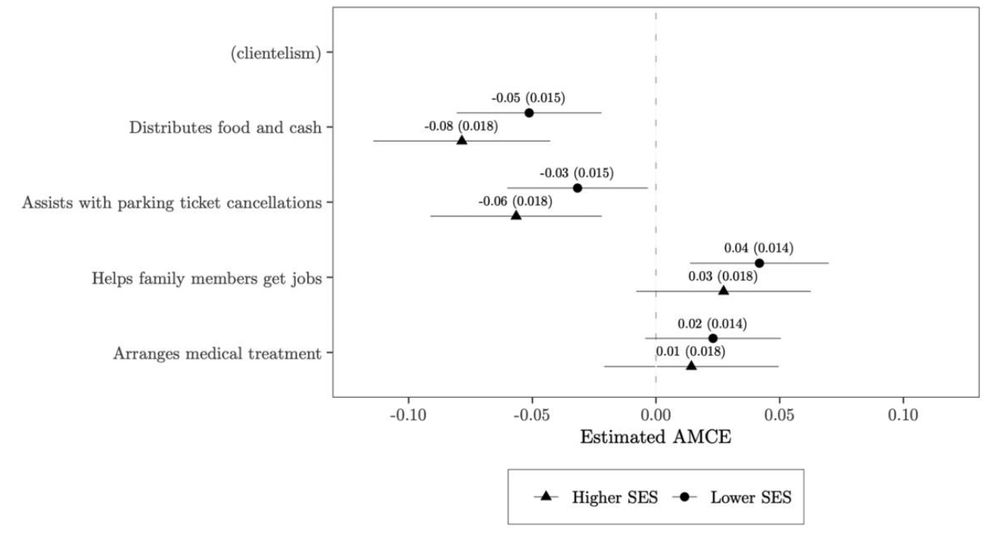
Christiana Parreira
@cmparreira.bsky.social
political scientist • assistant professor at the Geneva Graduate Institute (IHEID) • PhD Stanford • governance and elections in the Middle East
📍 geneva • beirut 🔗 christianaparreira.com
📍 geneva • beirut 🔗 christianaparreira.com
Ultimate takeaway: municipalities in Lebanon are key intermediaries between ordinary people and the state in everyday politics. People elect who they think will faciliate their access to state power. For now, it’s mostly the same establishment parties, with a few exceptions. /14
June 2, 2025 at 12:15 PM
Ultimate takeaway: municipalities in Lebanon are key intermediaries between ordinary people and the state in everyday politics. People elect who they think will faciliate their access to state power. For now, it’s mostly the same establishment parties, with a few exceptions. /14
Notably, an analogous diminishing of electoral power largely did not occur in Hezb's historical strongholds: the "Shia duo" seemingly held onto most affiliated councils, suggesting the 2024 war did not significantly impact their local electoral machinery /13
June 2, 2025 at 12:15 PM
Notably, an analogous diminishing of electoral power largely did not occur in Hezb's historical strongholds: the "Shia duo" seemingly held onto most affiliated councils, suggesting the 2024 war did not significantly impact their local electoral machinery /13
Meanwhile, the FPM has suffered from internal chaos over the past few years, and their grip on power within their Christian community loosened this cycle. For example, in Zahle, where they won a victory in 2016 allied with the LF, they abstained from running altogether /12
June 2, 2025 at 12:15 PM
Meanwhile, the FPM has suffered from internal chaos over the past few years, and their grip on power within their Christian community loosened this cycle. For example, in Zahle, where they won a victory in 2016 allied with the LF, they abstained from running altogether /12
In Tripoli, Future historically struggled to gain control, and was absent from competition this round. A list backed by local MPs (Kabbara, Rifi, Karame, etc) won 12/24 seats, while an anti-establishment list (Fabric of Tripoli) gained 11 seats in a rare newcomer victory /11
June 2, 2025 at 12:15 PM
In Tripoli, Future historically struggled to gain control, and was absent from competition this round. A list backed by local MPs (Kabbara, Rifi, Karame, etc) won 12/24 seats, while an anti-establishment list (Fabric of Tripoli) gained 11 seats in a rare newcomer victory /11
For example, in Saida, the Future Movement once maintained an iron-clad grip on local politics. No more: less than half of seats (10/21) were won by a list loosely endorsed by the party, while its opponents (Saad, Bisri, the Islamic Group, independents) captured 11 spots /10
June 2, 2025 at 12:15 PM
For example, in Saida, the Future Movement once maintained an iron-clad grip on local politics. No more: less than half of seats (10/21) were won by a list loosely endorsed by the party, while its opponents (Saad, Bisri, the Islamic Group, independents) captured 11 spots /10
In some areas, new patterns of competition and surprising results emerged due to the near-collapse of two governing parties since the last local elex (Future Movement and Free Patriotic Movement). These parties floundered in places where they once played a key role /9
June 2, 2025 at 12:15 PM
In some areas, new patterns of competition and surprising results emerged due to the near-collapse of two governing parties since the last local elex (Future Movement and Free Patriotic Movement). These parties floundered in places where they once played a key role /9
Worth noting Lebanon's local electoral laws (majoritarian, open-list) bias toward broad alliances. Reinforcing this are national consociational institutions and informal norms, which all favor oversize governing coalitions. The result: blockage of outsider entry. Except... /8
June 2, 2025 at 12:15 PM
Worth noting Lebanon's local electoral laws (majoritarian, open-list) bias toward broad alliances. Reinforcing this are national consociational institutions and informal norms, which all favor oversize governing coalitions. The result: blockage of outsider entry. Except... /8
In Beirut, for example, most of the major party cartel members (LF, Kataeb, Hezb, Amal) and governing elites allied. A similar dynamic emerged in Christian-majority Jounieh, where the LF, Kataeb, and a variety of prominent local MPs (Frem, Khazen, Bon) ran together /7
June 2, 2025 at 12:15 PM
In Beirut, for example, most of the major party cartel members (LF, Kataeb, Hezb, Amal) and governing elites allied. A similar dynamic emerged in Christian-majority Jounieh, where the LF, Kataeb, and a variety of prominent local MPs (Frem, Khazen, Bon) ran together /7
So how did the governing parties stave off challenges from outsiders, including reformists once buoyed by the 2019 protest movement? One answer: they allied with one another (even across ideological lines), much like in post-war local elex in 2016, 2010, and 2004 /6
June 2, 2025 at 12:15 PM
So how did the governing parties stave off challenges from outsiders, including reformists once buoyed by the 2019 protest movement? One answer: they allied with one another (even across ideological lines), much like in post-war local elex in 2016, 2010, and 2004 /6
Another secular reformist movement, Citizens in a State (MMFD), ran incomplete lists in several cities, including Beirut, where they won an estimated 1-2% of the vote. Other reformist/anti-establishment lists in Baalbek and Sour similarly failed to challenge governing parties /5
June 2, 2025 at 12:15 PM
Another secular reformist movement, Citizens in a State (MMFD), ran incomplete lists in several cities, including Beirut, where they won an estimated 1-2% of the vote. Other reformist/anti-establishment lists in Baalbek and Sour similarly failed to challenge governing parties /5
Instead, secular reformist lists ran autonomously in many cities, including the capital, where the "Beirut Madinati" list attempted to revive the slogan used by activists in 2016. While they received ~40% of the vote in 2016, they secured less than 10% this round /4
June 2, 2025 at 12:15 PM
Instead, secular reformist lists ran autonomously in many cities, including the capital, where the "Beirut Madinati" list attempted to revive the slogan used by activists in 2016. While they received ~40% of the vote in 2016, they secured less than 10% this round /4
First, it's important to note what *didn't* happen: coordination between secular reformist (i.e. "change" or "revolutionary") groups to field candidates under a coherent banner throughout the country. This might be partly due to the short notice on which elex were announced /3
June 2, 2025 at 12:15 PM
First, it's important to note what *didn't* happen: coordination between secular reformist (i.e. "change" or "revolutionary") groups to field candidates under a coherent banner throughout the country. This might be partly due to the short notice on which elex were announced /3
A few trends emerged from these elections. I'll talk about three: (1) underperformance of the secular reformist movement, (2) endurance of alliances between members of the post-war sectarian party cartel, and (3) shifts in power due to the decline of two ex-governing parties /2
June 2, 2025 at 12:15 PM
A few trends emerged from these elections. I'll talk about three: (1) underperformance of the secular reformist movement, (2) endurance of alliances between members of the post-war sectarian party cartel, and (3) shifts in power due to the decline of two ex-governing parties /2
Reposted by Christiana Parreira
In case you’re currently on the market: With a welcoming stance toward non-Swiss students (34.7% of the student body), Switzerland remains an attractive option.
Also notable: a clear shift in interest among non-US students re PhD opportunities (shared via @marcelsalathe.bsky.social): polisky
Also notable: a clear shift in interest among non-US students re PhD opportunities (shared via @marcelsalathe.bsky.social): polisky

May 31, 2025 at 8:16 AM
In case you’re currently on the market: With a welcoming stance toward non-Swiss students (34.7% of the student body), Switzerland remains an attractive option.
Also notable: a clear shift in interest among non-US students re PhD opportunities (shared via @marcelsalathe.bsky.social): polisky
Also notable: a clear shift in interest among non-US students re PhD opportunities (shared via @marcelsalathe.bsky.social): polisky
Where does this leave us? We suggest more work should be done (a) probing how clientelism works among higher-income voters, and (b) how income and partisanship interactively mediate demand for clientelism across the socioeconomic spectrum. /8
May 15, 2025 at 4:39 PM
Where does this leave us? We suggest more work should be done (a) probing how clientelism works among higher-income voters, and (b) how income and partisanship interactively mediate demand for clientelism across the socioeconomic spectrum. /8
We also find that co-partisanship mediates preferences for clientelism among higher-income citizens, but not others. We (tentatively) think this suggests that higher-income voters develop different, more relational ties with clientelist parties /7

May 15, 2025 at 4:39 PM
We also find that co-partisanship mediates preferences for clientelism among higher-income citizens, but not others. We (tentatively) think this suggests that higher-income voters develop different, more relational ties with clientelist parties /7
Interestingly, we find no difference in preferences between higher- and lower-income citizens. Everybody disfavors low-value clientelism (food or cash), and everybody favors higher-value goods (medical care or jobs) /6

May 15, 2025 at 4:39 PM
Interestingly, we find no difference in preferences between higher- and lower-income citizens. Everybody disfavors low-value clientelism (food or cash), and everybody favors higher-value goods (medical care or jobs) /6
We also investigate how co-partisanship mediates these preferences - do people prefer clientelism when it's being offered by an elite from a political party they generally support? /5
May 15, 2025 at 4:39 PM
We also investigate how co-partisanship mediates these preferences - do people prefer clientelism when it's being offered by an elite from a political party they generally support? /5
Using a conjoint experiment in Lebanon, we test the claims that (1) lower-income citizens demand clientelism at higher rates, and (2) that higher-income citizens prefer higher-value goods (like medical care and access to jobs) /4
May 15, 2025 at 4:39 PM
Using a conjoint experiment in Lebanon, we test the claims that (1) lower-income citizens demand clientelism at higher rates, and (2) that higher-income citizens prefer higher-value goods (like medical care and access to jobs) /4
We also know it’s not that simple - clientelism takes on many forms, including higher-value goods that would be helpful to almost anyone. We also know that in some contexts, like Lebanon, programmatic services are scarce, making clientelist goods more valuable in general /3
May 15, 2025 at 4:39 PM
We also know it’s not that simple - clientelism takes on many forms, including higher-value goods that would be helpful to almost anyone. We also know that in some contexts, like Lebanon, programmatic services are scarce, making clientelist goods more valuable in general /3

